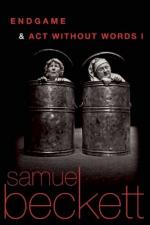|
This section contains 1,950 words (approx. 7 pages at 300 words per page) |

|
SOURCE: Williams, Paul. “Samuel Beckett's Endgame.” English Review 11, no. 3 (February 2001): 17.
In the following essay, Williams explores the rejection of God and God's works in Endgame, and underscores humankind's ability and almost eagerness to self-destruct in a nuclear era.
Endgame appears to be set after a nuclear war, although this is only suggested and never made explicit. The characters inhabit a desolate world that is ‘corpsed’ outside the walls of their dwelling, an ‘other hell’ where the earth has been ‘extinguished’. It is a barren place, where the ‘light is sunk’ and the land is immersed in a grey glow. We are told there ‘are no more coffins’ and that the ‘whole place stinks of corpses’. This points us towards the idea that humanity has been virtually wiped out, with the suggestion that the survivors are unable to contain the numbers of the dead.
There are other indicators. We...
|
This section contains 1,950 words (approx. 7 pages at 300 words per page) |

|


